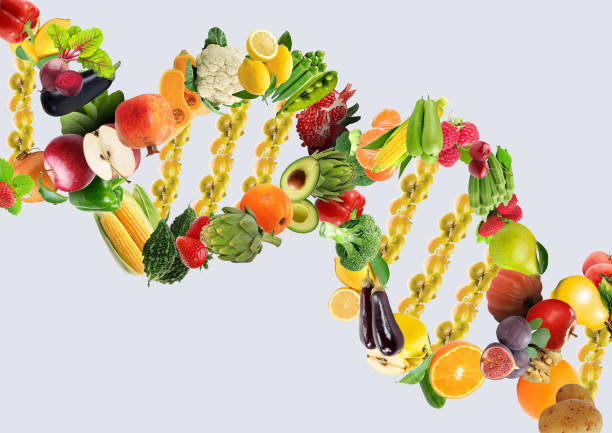In the fast-paced world, people often overlook the problems related to poor nutrition, but these can have long-lasting effects that might not be visible right away. These poor dietary practices not only cause weight gain but can impact mental health, aging processes and cellular function. In this article, I am going to discuss some of the relatively lesser-known but increasingly significant roles of poor nutrition versus a healthy diet.
Importance of Eating Healthy Food
Healthy food directly affects more than just your physical appearance. Newer research shows that diets full of nutrients like polyphenols in fruits and vegetables can positively influence gene expression. These, in turn, switch on genes that repair your cells or even prevent cancer.

Also, diets that are rich in phytonutrients (natural chemicals produced by plants) help to counteract the toxic effects of free radicals, unstable molecules, and other environmental pollutants that may harm cells over time. Phytonutrients are not only in popular foods stateside like berries, but they are also found in exotics and rares such as seaweed, dandelion greens, and maca root, which contribute to good health.
In fact, poor nutrition results in a decrease in the body’s ability to repair dead cells, which ultimately makes us more susceptible and prone to illnesses, aging earlier than we should.
How Does Eating Healthy Affect Your Body?
We all know that healthy eating benefits many parts of the body, but the impact it has on telomeres; “telomers are the little caps that protect our chromosomes at the ends”, is less universally known. Our chronologically aged telomeres will naturally shorten, but we can help prevent premature cellular aging by avoiding cheap junk foods. Nevertheless, a high-antioxidant diet can protect telomeres and prevent us from aging faster; these compounds are abundant in green vegetables, nuts, and berries, according to research.

A more unusual fact is that malnutrition actually raises homocysteine levels, an amino acid found in the blood associated with heart disease, Alzheimer’s and strokes. The deficiency of B vitamins; particularly folic acid, B6, and B12, is what leads to super high homocysteine levels. They are found in large quantities in foods such as spinach, legumes and cereal.
Indeed, the gut microbiome, which is an inflammatory hot-button issue in health these days, appears to be overwhelmingly shaped by simple diet. An unbalanced diet of processed foods that are very low in fiber can disrupt the natural balance of gut bacteria. This will trigger problems within your digestive system, cause inflammation, and could possibly lead to incurable cases of depression. While gut-friendly fermented foods such as sauerkraut, kimchi and kefir can help to replenish the goodies living in your colon, they are rarely found on our dinner plates.
Healthy Facts
Hydration: Most people know the importance of drinking water, but did you know that chronic dehydration can actually shrink your brain size? A study from Harvard Medical School found that dehydration can cause brain tissue to contract, leading to impaired cognitive function. The brain is made up of about 75% water, so it’s vital to stay hydrated to maintain focus and mental sharpness.

Fiber-Rich Foods: Everyone knows fiber helps digestion, but fewer people are aware of its effects on hormone levels. Soluble fiber, in particular, helps regulate the body’s estrogen levels by binding to excess estrogen in the digestive system and helping to eliminate it. This can be very beneficial for women experiencing symptoms of hormonal imbalance, such as bloating or mood swings.
Essential Fats: Omega-3 fatty acids are well-known for heart health, but did you know they can also affect your mood? Researches have shown that omega-3 fatty acids, particularly those found in fish oil, can eliminate symptoms of depression and even improve cognitive function. The lesser-known Eicosapentaenoic Acid (EPA) found in fatty fish like mackerel and sardines is especially effective in supporting brain health.

Vitamins and Minerals: Everyone hears about calcium and vitamin D (for bone health) but magnesium is also another very important mineral not talked about as often. Magnesium assists with more than 300 enzyme reactions in the body for: Muscle and nerve function, Blood sugar regulation, Energy production,…etc. Magnesium is found in small amounts in foods like pumpkin seeds, spinach and black beans but many diets are low in this essential mineral.
In addition, selenium, a lesser-known mineral found in Brazil nuts and seafood, which assists in protecting cells against free radicals leading to oxidative stress and is crucial for thyroid function. Deficiencies in selenium can lead to fatigue, brain fog, and immune system issues, but it is rarely discussed in mainstream nutrition.
Conclusion
The less common knowledge about poor nutrition reveals just how deeply our diet impacts not just our weight or appearance, but our cells, genes, and even brain function. By consuming nutrient-dense foods in your daily routine, such as those rich in antioxidants, omega-3s, and phytonutrients, you can support your body’s natural defense systems and slow down the aging process. Nutrition is about more than just calories, it’s about empowering your body to function optimally at every level.
Thank you for reading my article about “Effects Of Poor Nutrition” and I would love to receive your comments down below, in case of any.

